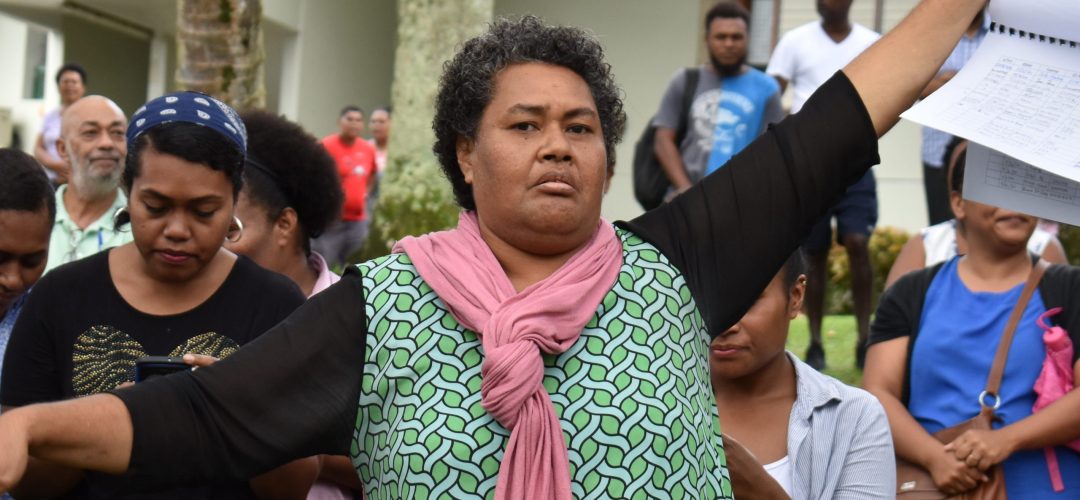Thompson maintains stance on suspension of USP’s VC

USP staff and students gather outside the New Administration Conference Room to show support for suspended VC Professor Pal Ahluwalia. Picture: Eliki Drugunalevu
By WANSOLWARA STAFF
The decision to suspend the academic chief of The University of the South Pacific pending the outcome of an investigation into allegations of material misconduct was made legally by the University’s executive committee, says Pro-Chancellor Winston Thompson.
Mr Thompson was responding to claims from concerned staff, students and some council members that the suspension of Vice-Chancellor Professor Pal Ahluwalia on Monday was illegitimate.
During a press conference at USP’s Research Office at Laucala campus today, he said the University’s statutes and ordinances to govern the discipline of the VC gave them the mandate to act on behalf of the full Council, noting that the investigation of material misconduct against the VC was a separate issue and in no way linked to the log of allegations of financial mismanagement against past management put forth to the Council by Prof Ahluwalia in March last year.
“This investigation of the VC, which was the subject of the meeting on Monday, is a different thing completely. These are allegations of misdemeanors, material misconduct that the current VC has been responsible for since he has been in office,” Mr Thompson said.

“There is a lot of misinformation, disinformation and downright untruths that are being put into the public domain and that is causing everyone, especially staff and students, to be concerned.
“An independent investigation is going to be carried out to establish whether these allegations against the VC are true or not. This process would also clear him (Prof Ahluwalia) if he has not caused any gross negligence in the discharge of his responsibility.
“A suspension doesn’t mean that he is guilty but the allegations need to be investigated, and there are not one or two allegations. There is a long list but a thorough investigation will be carried out so that the facts of those allegations will come forward.
“The governance instruments under which we operate are clear. The EC has the power under the Statutes and Ordinances of the University to take action in the case that it did on issues that it took on Monday. For anyone to claim that it is acting illegally is clearly incorrect.”
He said the terms of the EC was to take action when it seemed there was something serious taking place at the University and by mandate, the EC was not required to consult the whole membership of the council.
“So we do these things in our own judgement and in this case, there was clear evidence that some material misconduct had taken place, and we needed to deal with it. I was prepared to handle it internally and keep it under control but it was taken out of our hands when the whole Council was circulated with all the material. The EC is empowered to do these things, it doesn’t have to consult the whole of the council members,” Mr Thompson said.
This week, USP’s incoming Chancellor and Nauru’s President Lionel Aingimea called for a special Council meeting to urgently reverse what he claims was an illegitimate decision to suspend Prof Ahluwalia.
He claimed the decision by the EC had jeopardised the future of the institution and it was high time the Council met to begin the process of removing the Pro-Chancellor Winston Thompson and conduct the election of the deputy Pro-Chancellor.
Samoa’s Deputy Prime Minister Fiame Naomi Mataafa also told local media FBC that the USP Council did not suspend Prof Ahluwalia, contradicting Mr Thompson’s statement that the EC was empowered and that it did not have to consult the full Council.
“The Council itself is large and it meets twice a year and in between the Council meetings, the EC meets four times a year. The EC’s function is to decide on things that are delegated from the Council to do in between Council meetings and also in emergencies to act for the Council,” Mr Thompson said.
“So it isn’t just a small group of people meeting and making decisions. It is mandated to do these things when the University is under threat.”
Meanwhile, Mr Thompson confirmed that they had received a quorum to hold a full Council meeting and this would be organised once logistics were finalized.
However, he said his appointment was made by the Council and removing him would require two-thirds vote from the full Council.










